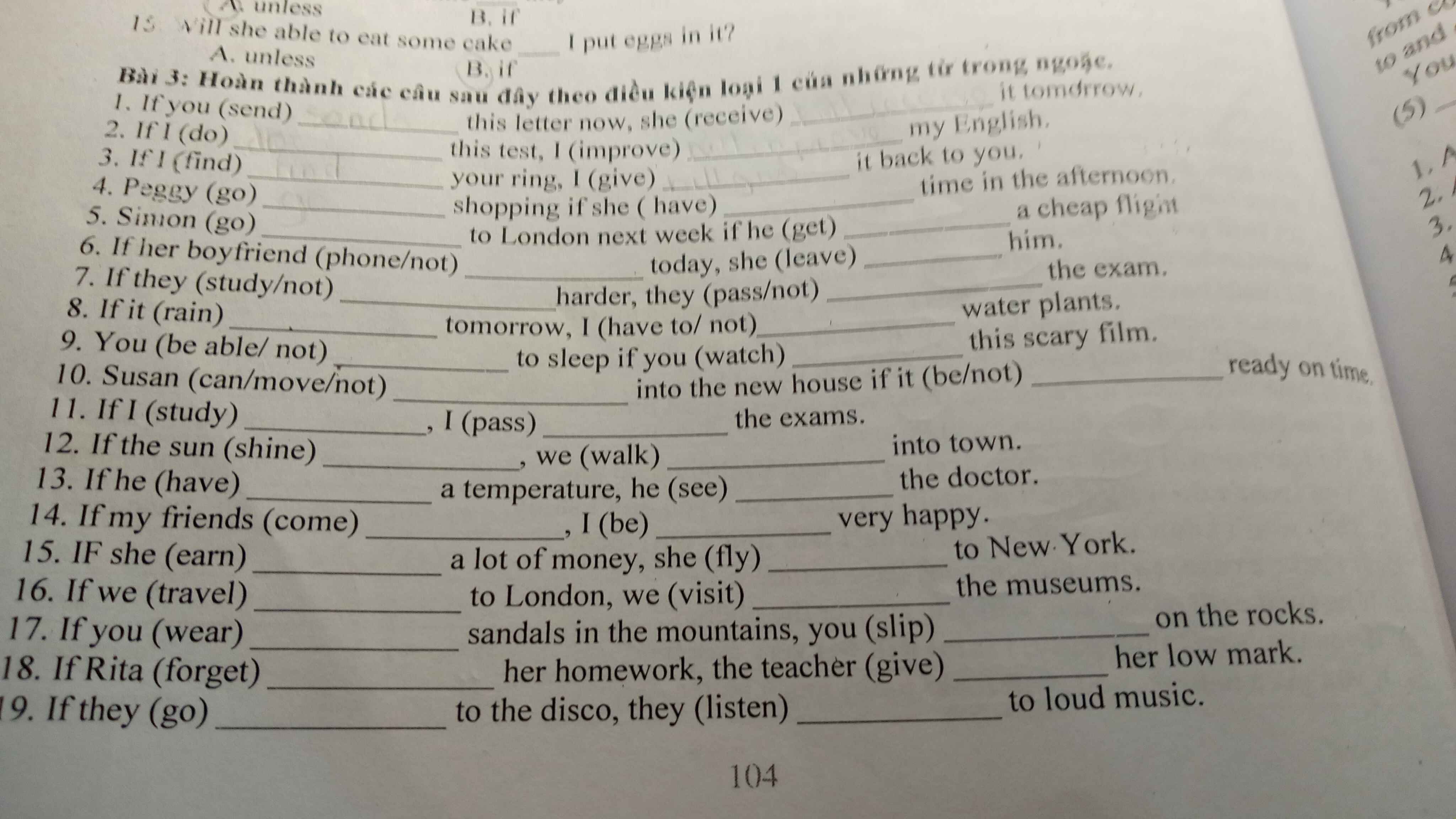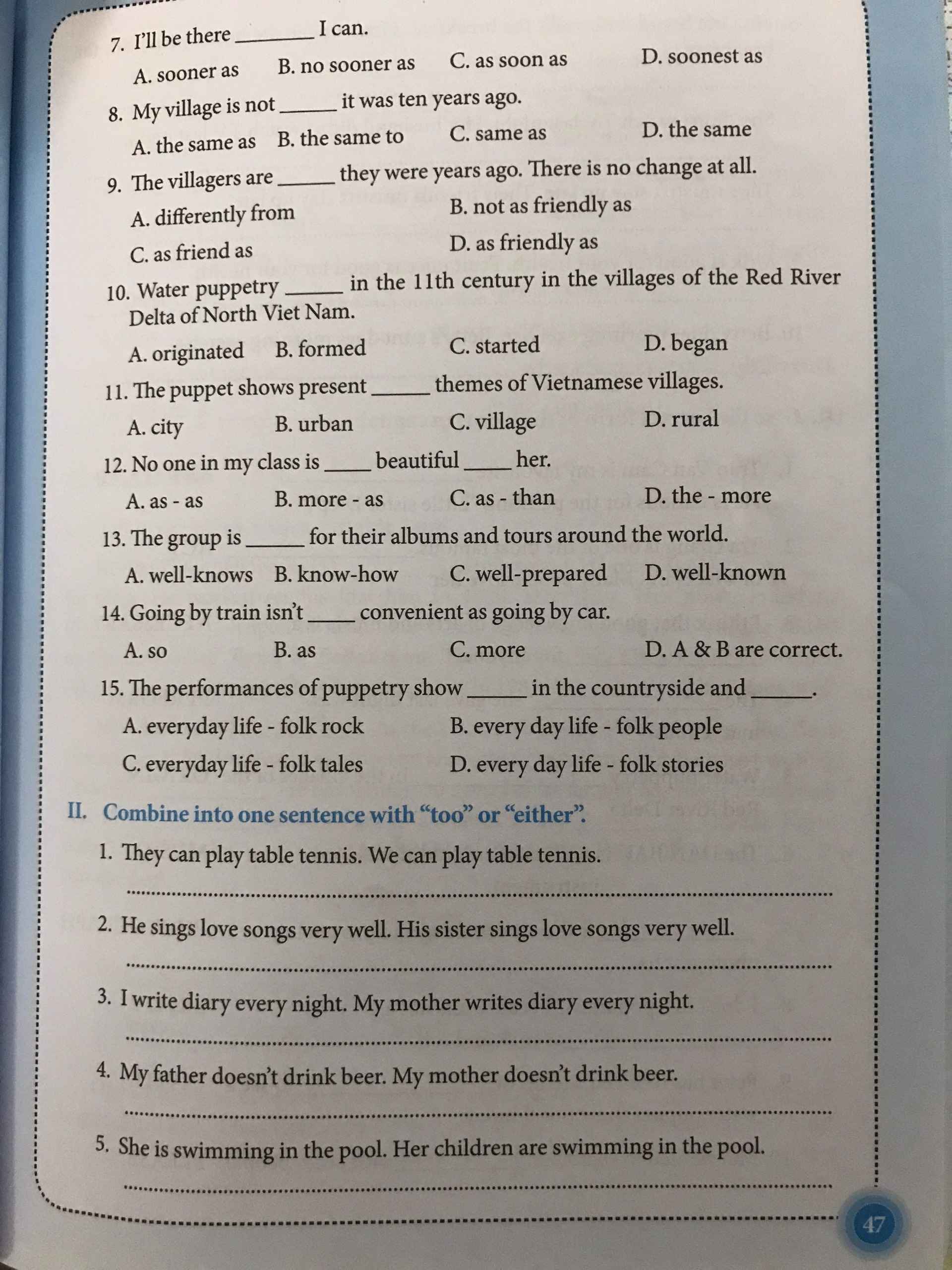Hãy nhập câu hỏi của bạn vào đây, nếu là tài khoản VIP, bạn sẽ được ưu tiên trả lời.


thank you very much. Best wishes to you , happy new year.

EX1.Write questions for thr underlined parts.
1.We are looking for (cheap,clean,effective sources of energy0
WHAT ARE YOU LOOKING FOR /
2.(Solar panels) are used to produce energy in that area.
WHAT ARE USED TO PRODUCE ENERGY IN THAT AREA/
3.We learn to reuse some daily products like empty bottles (to save money)
WHY DO WE LEARN TO REUSE SOME DAILY PRODUCTS LIKE EMPTY BOTTLES /
4.People from the countryside move to cities to find (word and better standard of living)
WHAT DO PEOPLE FROM THE COUNTRYSIDE MOVE TO THE CITY TO FIND/
5.People like using urban transport pods (because they are very convenient and safe)
WHY DO PEOPLE LIKE USING URBAN TRANSPORT PODS/

Học tiếng anh không có giới hạn đâu ( những từ học năm lớp 3 đến nay vẫn áp dụng thôi) nên cậu cứ ôn hết điểm ngữ pháp từ đầu năm nhé, đọc kĩ tất cả các đoạn hội thoại, đoạn văn và ôn lại các điểm ngữ pháp. Trả lời lại những câu hỏi trong sách giáo khoa và làm những kiểu bài tập như: sắp xếp, thêm từ ngữ để có câu hoàn chỉnh, điền từ thích hợp vào chỗ trống, chia động từ,...
<3 <3 <3
Tiếng anh phãi làm một quá trình dài lặp đi lặp lại cấu trúc mới nằm lòng bạn à

Dịch bài:
gày 10 tháng 10...
Hoa thân yêu,
Bố mẹ hy vọng con vẫn khỏe mạnh. Bố mẹ đều khỏe cả, sắp đến mùa gặt nữa rồi và bổ mẹ đang làm việc rất căng ở trang trại. Ông của con thường đến làm với bố mẹ. Ông giúp rất nhiều. Ông nói nhiều về con và mong con được khỏe mạnh.
Mẹ nhận được thư của cô con tuần rồi. Cô viết nhiều về con. Vậy là bây giờ con tập thể dục buổi sáng phải không, Hoa? Ở Huế con chẳng bao giờ thích dậy sớm. Ba mẹ rất vui khi nghe con hiện giờ đã dậy sớm.
Mẹ cũng hy vọng con đang tự chăm sóc mình. Cô con rất bận rộn, vậy phải nhớ giặt và ủi quần áo của con, vả đừng ăn quá nhiều kẹo hay thức khuya. Những thứ ấy có hại cho con.
Mẹ nhớ con lắm. Bố mẹ hy vọng sớm đến thăm con ở Hà Nội, có lẽ sau mùa gặt. Đừng quên viết thư cho mẹ nhé Hoa.
Thương,
Mẹ
Trả lời câu hỏi:
a) Because it’s nearly the harvest time again.
b) Her grandfather helps them on the farm.
c) They will probably go to Ha Noi after the harvest.
d) She knows how to take care of herself. She's doing what she didn't do when she was at home in Hue.

Electric Cars
Hybrids vehicles, with their combination of both gas and battery power, represent 3% of the cars on the road today, up from zero just ten years ago. Fully electric cars like the Nissan Leaf and Tesla are mere curiosities, representing only 0.1% of all cars purchased in the U.S.
It might seem like a slow start, but electric cars will soon form the majority of all vehicles. Here’s why:
Except for early adopters of technology and diehard environmental customers, most people aren’t buying a fuel type, they’re buying transportation. They may want speed or economical transportation or family-friendly minivans, but how the vehicle is powered isn’t their main concern.
Examples like the Tesla have shown that electric vehicles perform on par with gas-powered cars. What limits their adoption then? Two factors: cost and range (and charging infrastructure, to a lesser extent, but that will be remedied when there is more demand).
The Nissan Leaf battery pack alone costs about $18,000 (though government incentives bring down the overall vehicle cost to the customer). When comparable gas-powered cars are about $20,000, the high cost of the battery pack alone is a huge barrier to widespread adoption, whether the cost passed on to the customer or the government, or hidden by the manufacturer.
Ramez Naam, author of The Infinite Resource: The Power of Ideas on a Finite Planet, recently explained that lithium-ion batteries have a fifteen year history of exponential price reduction. Between 1991 and 2005, the capacity that could be bought with $100 went up by a factor of 11. The trend continues through to the present day.
This exponential reduction in battery cost and improvement in battery technology, more than anything else, will affect both the cost and range of electric cars. By 2025, that Nissan Leaf battery pack will cost less than $1,800, making the cost of the electric motor plus battery pack less than the price of a comparable gasoline motor. Assuming even modest increases in storage capacity, the electric vehicle will rank better on initial cost, range, performance, and ongoing maintenance and fuel costs.
With both lower cost and better performance, electric vehicles will likely overtake gasoline-powered ones by about 2025.

Cindy's bike or Chi's ... always well clean.
A.are
B.is
C.to be
D.being




1 send - will receive
2 do - will improve
3 find - will give
4 will go - has
5 will go - gets
6 doesn't phone - will leave
7 don't study - won't pass
8 rains - won't have to
9 won't be able to - watch
10 cann't move - isn't
11 study - will pass
12 shines - will walk
13 has - will see
14 come - will be
15 earns - will fly
16 travel - will visit
17 wear - will slip
18 forgets - will give
19 go - will listen